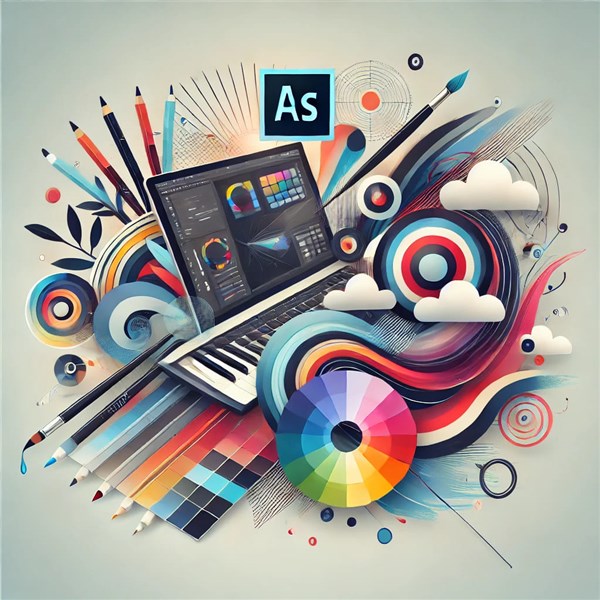
In the fast-paced world of creative industries, where technology and design trends evolve rapidly, staying competitive is crucial. Whether you're a graphic designer, video editor, photographer, or any other creative professional, having the right set of skills and tools at your disposal is essential to success. This is where Adobe certification comes into play. Adobe, a global leader in creative software, offers a range of tools like Photoshop, Illustrator, Premiere Pro, After Effects, and many others that are fundamental to the work of creative professionals. Gaining certification in these tools can set you apart in the job market, help you sharpen your skills, and open up a wide range of career opportunities.
In this blog, we’ll explore why Adobe certification is essential for creative professionals and how it can boost your career in the competitive world of design, video editing, multimedia, and more.
Importance of Adobe Certification
1. Enhance Your Skills and Expertise
The most significant benefit of Adobe certification is the knowledge and expertise you gain while preparing for the exam. Adobe’s certification process covers the full functionality of its tools and ensures that you have a deep understanding of their advanced features. Whether it’s learning how to leverage Photoshop’s powerful editing capabilities or mastering After Effects for motion graphics, certification ensures you are using the software to its full potential.
By earning Adobe certification, you gain a structured path to learn not just the basics but also the more advanced features that may otherwise go unnoticed. This comprehensive training enables you to create high-quality work that can stand out in a crowded market.
2. Increase Job Opportunities
With more businesses relying on digital content, the demand for creative professionals with expertise in Adobe tools continues to grow. Whether you’re looking to work as a freelance designer, a full-time video editor, or a multimedia specialist, employers often look for candidates who have proficiency in Adobe software.
Adobe certification makes you a more attractive candidate in the job market. It is a tangible proof of your ability to effectively use the industry’s leading creative tools, and many employers consider certification a valuable asset when hiring. It also signals that you are dedicated to professional growth and committed to staying current with the latest design trends and technologies.
3. Gain Credibility and Professional Recognition
Certification serves as proof of your expertise, and in creative industries, credibility is key. Adobe certifications carry significant weight within the design, video editing, and multimedia communities. When you achieve Adobe certification, it tells clients, employers, and colleagues that you have invested the time and effort to master industry-standard tools.
For freelancers, Adobe certification can be a major selling point when attracting clients. It establishes trust and helps differentiate you from other professionals who may not have the same credentials. For those working in-house or at design agencies, it enhances your professional profile and can increase the chances of career advancement or promotions.
4. Stay Ahead of the Competition
In the creative industry, the tools and technologies used to create digital content evolve quickly. Staying ahead of the competition means constantly improving your skills and mastering the latest features that Adobe software provides. With regular updates and new tool functionalities, Adobe’s ecosystem is dynamic and ever-changing.
Through Adobe certification, you demonstrate that you’re not only familiar with the tools but also committed to staying updated with the latest advancements. This helps you stay ahead of your competitors in terms of both creativity and technical expertise, making you a more valuable asset to employers and clients.
5. Improve Workflow Efficiency
Adobe certification equips you with the ability to use each tool in the most efficient way possible. Understanding the full capabilities of Adobe Photoshop, Illustrator, Premiere Pro, and other software allows you to create designs, edits, and projects in less time with better results.
For instance, learning advanced techniques such as non-destructive editing in Photoshop or automating video effects in Premiere Pro can significantly reduce the time spent on each project. These productivity-enhancing techniques also improve the quality of your work, making you more efficient and effective as a creative professional.
6. Access to Exclusive Resources and Networking Opportunities
Adobe offers more than just certifications. As an Adobe Certified Expert, you gain access to exclusive resources such as certification preparation materials, training videos, and communities of certified professionals. These resources can help you continually improve your skills and stay up-to-date with the latest trends.
Additionally, being certified opens doors to a global network of professionals and employers within the Adobe ecosystem. This can lead to opportunities to collaborate on projects, learn new skills, and even find new job opportunities. Networking with fellow Adobe-certified experts can also provide insights into best practices and the latest industry innovations.
7. Potential for Career Advancement and Higher Salaries
Many companies see Adobe-certified professionals as a reliable source of expertise. As a result, certified professionals are often considered for higher-level roles or leadership positions. Adobe certification can be a stepping stone for career advancement within design agencies, production companies, and in-house creative teams.
Additionally, Adobe-certified professionals tend to earn higher salaries compared to those without certification. The value added to the organization by someone who can effectively use Adobe tools and create stunning, high-quality content justifies the investment in training and certification. Research shows that certified professionals in creative fields often command a premium in terms of salary and job opportunities.
8. Master a Range of Adobe Tools
Adobe offers a comprehensive suite of software designed to cater to every aspect of the creative process. Whether it’s Adobe Photoshop for image editing, Illustrator for vector design, Premiere Pro for video editing, or InDesign for page layout, these tools are the industry standard. A single Adobe certification may be beneficial, but you can also pursue certifications across different Adobe tools, enabling you to expand your skill set.
For example, obtaining certification in both Adobe Photoshop and Illustrator makes you a more versatile designer, capable of handling a wide range of design projects. Similarly, combining video editing expertise with graphic design knowledge can increase your ability to handle multimedia projects, making you more attractive to employers and clients alike.
9. Self-Paced Learning and Flexibility
Adobe offers online certification exams that allow you to learn at your own pace. Whether you're studying part-time while holding a full-time job or prefer intensive, full-time learning, the flexibility of Adobe’s certification process allows you to progress according to your own schedule. The courses are available through Adobe’s training partners and offer both beginner and advanced-level content.
This self-paced learning approach makes Adobe certification accessible to professionals with busy schedules, providing the flexibility to balance career, personal life, and studies. You can take the time to master each topic and prepare for your exam at a pace that suits your needs.
10. Gain a Competitive Edge for Freelancing Opportunities
Freelancers in the creative industries face stiff competition. In many cases, clients are looking for individuals with a proven track record of expertise, and Adobe certification can serve as a differentiator. By becoming certified, you show potential clients that you not only have the creative talent but also the technical proficiency to deliver exceptional work using industry-standard software.
This is especially beneficial for freelancers who may be just starting out or are seeking to expand their client base. A recognized Adobe certification assures clients of your competence and professionalism, which can lead to more high-quality projects and a broader client portfolio.
Conclusion
In today’s competitive creative industries, Adobe certification is more than just a credential — it’s a pathway to success. By earning Adobe certification, you enhance your skillset, increase job opportunities, gain industry recognition, and open doors for career advancement. Whether you are a graphic designer, video editor, multimedia artist, or a creative professional of any type, obtaining Adobe certification is a smart investment that can provide long-lasting benefits.
From improving workflow efficiency to providing a competitive edge in the job market, Adobe certification helps you stay ahead of industry trends and proves your dedication to continuous learning. If you want to advance your career and build your credibility as a creative professional, Adobe certification is an essential tool for success.
In this digital era, where the role of creative professionals is increasingly critical, having an Adobe Certification can make a world of difference in your career. By proving your expertise in Adobe products, you can stand out in the competitive job market, earn a higher salary, and gain access to exclusive resources.
To get started on your journey towards Adobe Certification, consider enrolling in Adobe training courses from Koenig Solutions, a leading IT training company providing certifications in top technology courses.







COMMENT